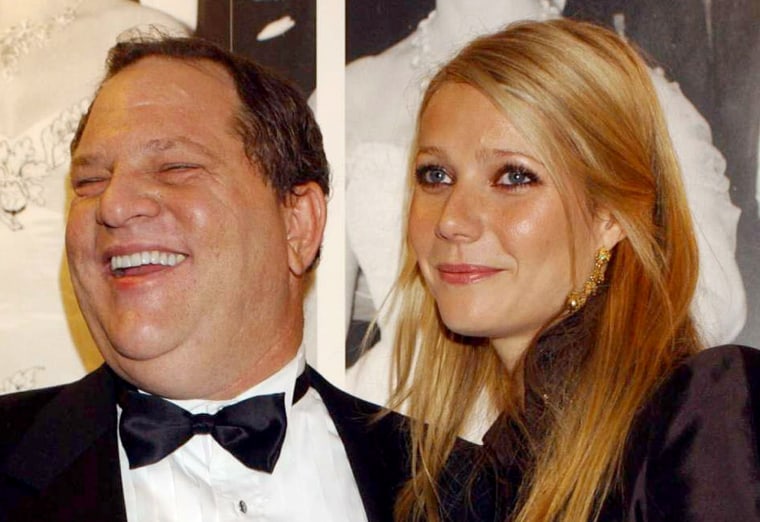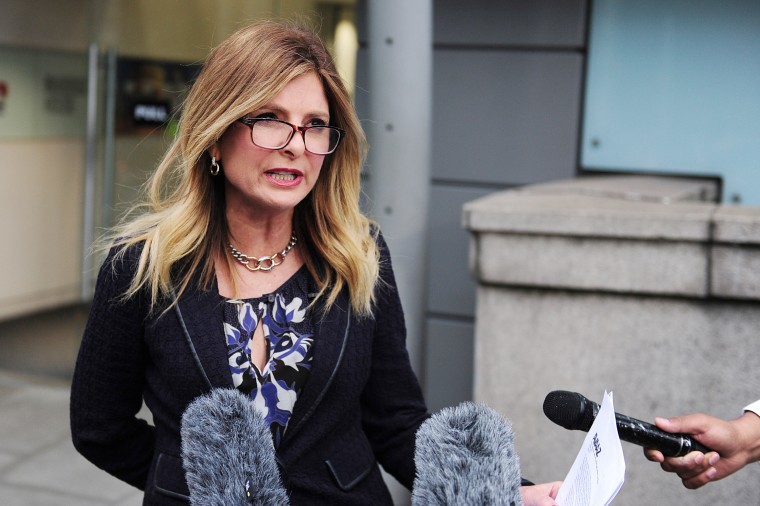Actress Gwyneth Paltrow was one of Harvey Weinstein's biggest success stories. So when the Hollywood producer got word that Paltrow was willing to assist The New York Times with a story into financial settlements dating back decades alleging sexual misconduct by the film mogul, he was determined to silence her, according to Times reporters.
"I think Harvey Weinstein was extremely aware and extremely scared of what the implications would be if his biggest star actually ended up going on the record," Megan Twohey, one of the two New York Times reporters who broke the October 2017 story detailing multiple accusations of sexual assault and harassment by Weinstein, told NBC's "Today" Show on Monday.
The revelation that Paltrow was one of the first actresses to speak to The Times, despite her fears about coming forward, is among details made public for the first time in "She Said: Breaking the Sexual Harassment Story That Helped Ignite a Movement," a book by Twohey and fellow reporter, Jodi Kantor.
Weinstein is accused by more than 80 women of inappropriate sexual behavior. He has denied any nonconsensual contact and has pleaded not guilty to sexual assault charges in New York, where he is set to go on trial in January. Prior to the New York Times article, Weinstein had reached settlements with at least eight women, including actress Rose McGowan.
Twohey and Kantor's article set off a global reckoning over sexual harassment using the hashtag #MeToo.
Their book, which will be published Tuesday, shines a light on key figures in the Weinstein investigation — including those who helped with their reporting, which later was awarded the Pulitzer Prize along with Ronan Farrow for his Weinstein coverage in the New Yorker.
The book also highlights those who helped Weinstein keep the accusations against him secret.
Weinstein slammed the book in a statement through his defense attorney, saying, "'She Says' is all you need to know to appreciate that this book contains one sided allegations without having adequately investigated the facts of each situation. There is very different side to every story."
Gwyneth Paltrow's panicked call to the reporters
Paltrow, who shot to stardom when she was 22 years old after Weinstein hired her as the lead character in "Emma," has claimed that before she started shooting the Jane Austen adaptation, Weinstein invited her to a work meeting at a hotel suite and sexually harassed her — something he told her not to share with anyone.
As Kantor and Twohey struggled to get actresses to speak on the record about accusations against Weinstein, Paltrow came forward with her story — even as Weinstein tried to intimidate her into silence, they said.

"Gwyneth was actually one of the first people to get on the phone, and she was determined to help this investigation, even when Harvey Weinstein showed up at a party at her house early, and she was sort of forced to hide in her bathroom," Twohey said.
From her bathroom, Paltrow placed a "panicked call" to Kantor, Kantor told "CBS This Morning" on Monday.
"She knew he was coming to the party, but he showed up early, and that was really scary," Kantor said.
A longtime accountant turned key source
Irwin Reiter, an accountant who worked for Weinstein for decades, served as a key source for the Times reporters.
Reiter was aware of the accusations and had become "very alarmed internally about what was happening," Kantor told "Today." For two years, she said, Reiter "struggled to do something about it to no avail."
While still employed by Weinstein, Reiter gave Kantor and Twohey an internal memo from an employee about Weinstein's pattern of harassment of his female employees and actresses that helped verify their reporting.
Reiter also tipped off the reporters, who were investigating decades-old financial settlements, to more recent sexual misconduct allegations against Weinstein.
"He sort of was the Deep Throat of the Weinstein investigation," Kantor said. "He met with us late at night in secret."
A new accuser speaks for the first time
Rowena Chiu, a former assistant at Miramax Films who received a settlement in 1998 after Weinstein allegedly tried to rape her in a Venice, Italy, hotel room, said she was bound by an iron-clad nondisclosure agreement. She was not ready to go on the record when Twohey and Kantor published their article in 2017, but agreed to be interviewed for their book.
Chiu said she suffered from depression and attempted suicide after Weinstein pinned her to a bed in a hotel room as they were reviewing scripts together.
In an exclusive interview with "Today" on Monday, Chiu said Weinstein asked her questions leading up to the incident about her professional and personal life and then asked her to sit on the bed and give him a massage. The mixture of questions about business and her life outside of work, interspersed with requests for massages, was "very typical of working with Harvey," she said.
"These kinds of requests escalate. Harvey is very persistent. He has a tendency to cajole. On this particular evening, he's a very big guy. He pushed me down on the bed and I was petrified and terrified as he tried to rape me."
In a statement, Weinstein pointed out that Chiu worked for his company for two years after the encounter — something Chiu acknowledged on Monday. Her nondisclosure agreement guaranteed she would stay employed if she remained silent, so Chiu said she didn't tell those closest to her, including her husband and family, about the alleged assault, and she said she continued working for Weinstein as she looked for jobs elsewhere.
"Nobody's going to give you a job when you've stopped working for Harvey Weinstein under unexplained circumstances," she said.
Weinstein's brother's failed attempts
Two years before the allegations against him were made public, Weinstein's brother and business partner, Bob Weinstein, wrote him a letter, urging him to get help.
"You have brought shame to the family and your company through your misbehavior," Bob Weinstein wrote, according to the Times. "Your reaction was once more to blame the victims, or to minimize the misbehavior in various ways. If you think nothing is wrong with your misbehavior so in this area then announce it to your wife and family."

The full letter is reprinted in "She Said," along with Bob Weinstein's first lengthy comments on his brother. He said at the time, he mistakenly saw Weinstein as suffering from sex addiction, and said after numerous attempts to stop Weinstein from acting out, he gave up.
"I got worn out," Bob Weinstein told the reporters. "I said, ‘I surrender.’"
Lisa Bloom's damning memo
Lisa Bloom, the daughter of famed women's rights attorney Gloria Allred and a vocal victims' rights attorney herself, was hired by Weinstein to keep the allegations from being made public.
In a memo written by Bloom in December 2016, published in "She Said," Bloom wrote that she could ruin McGowan's public image as a way of undermining her credibility.

"I feel equipped to help you against the Roses of the world, because I have represented so many of them," Bloom wrote, according to the Times. "We can place an article re her becoming increasingly unglued, so that when someone Googles her this is what pops up and she’s discredited."
Bloom also went with Weinstein on a surprise visit to the Times the day before the first article on him came out and tried to portray the accusers as unreliable, according to the reporters.
(Bloom has since called working on behalf of Weinstein a "colossal mistake" and said she regrets that she represented him.)
Twohey and Kantor told "Today" on Monday they did not expect their reporting to open a global conversation about sexual misconduct.
"We had no idea. We had hoped that this article would help bring out the truth about this one particular individual, but what we realized was that first article was just the beginning," Twohey said.
